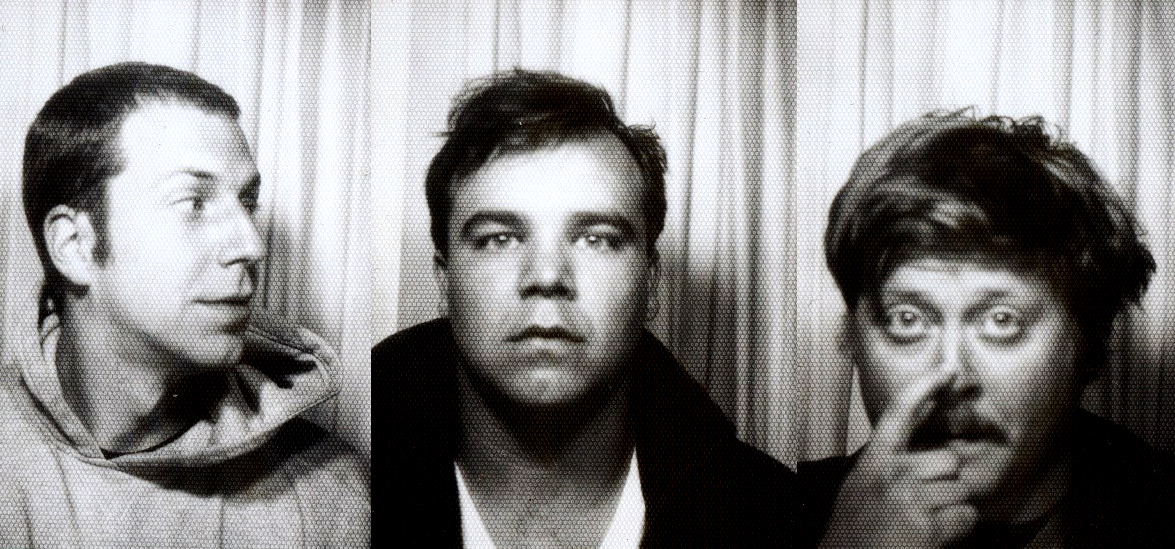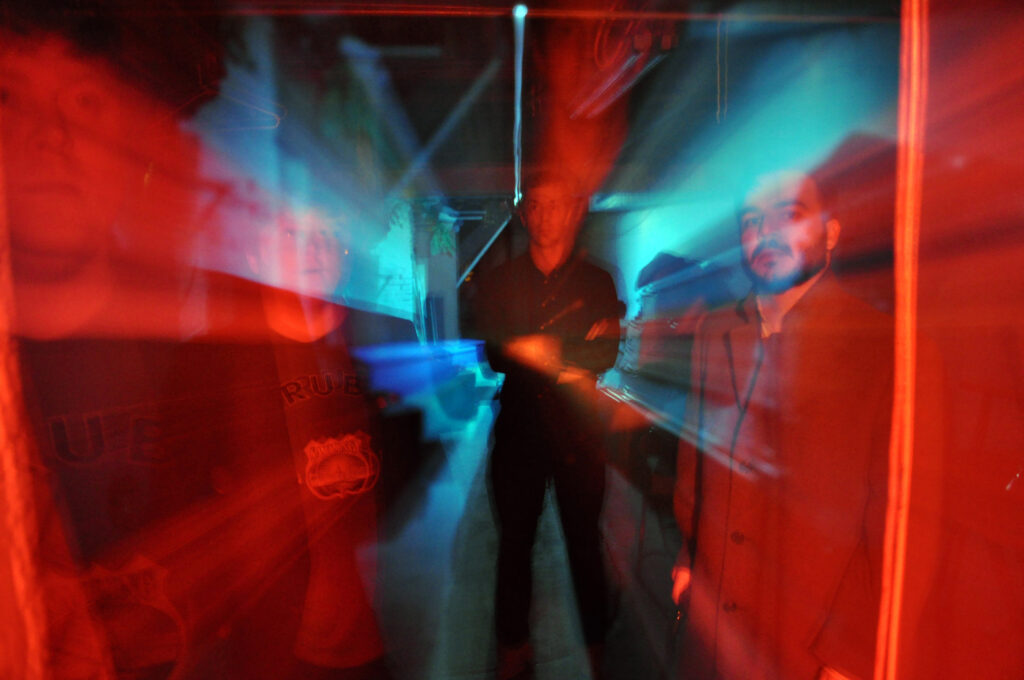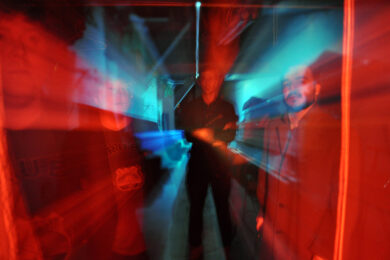In Evening Air is one of tQ’s albums of the year so far. Read Michael Dix’s review here
All bands should exist like a butterfly. Cocooned away in solitude and practice, just to emerge beautiful, fragile and glorious before being crushed on a wheel, snared in a spider’s web or swallowed by an ugly toad just hours later. All modern recording groups should be allotted a random number between one and ten, telling them how many gigs they are allowed to play before they must disband. The music business would collapse into chaos. Even the most avid early adopters would be thrust into a world of panic, no longer able to pick up on trends, everyone would have to trek out to gig venues night after night in the hope of randomly stumbling across something scintillating. These bands that existed only for a few days or two weeks would be truly revolutionary and make even the Manic Street Preachers’ original idea of releasing one album and then splitting up, laughably middle of the road. Music as an elemental force would be snatched out of the hands of the passive observers and commentators and shrink wrap collectors. The experience would be available only to those who were militantly part of the culture; to those 100% engaged. Howling mobs would gather outside the mansions of the Rolling Stones baying for their blood and mothers would tell their children cautionary tales about Gang Of Four, R.E.M. and, yes, even The Fall.
And if someone asked you breathlessly with a gleam in their eye, “Did you see Tattooed Ghost Horse at the Hull Adelphi last month?” Your heart would sink and you would know that you had missed something magical. And, who knows, maybe you would have done…
A dream. Not even a particularly nice dream, but an interesting one.
Many groups don’t get to play more than a handful of times. My hardcore band Anal Leakage only played once, with very good reason. Others might not be terrible but just unable to bear the weight of the personalities involved. One such band was Future Islands who (temporarily) split up one and three quarter songs into their second gig.
Gerrit, the silent keyboard player from the Thrill Jockey three piece, who has been staring at his bright white Reeboks all the way through the interview suddenly comes to life when the subject of their rocky second live performance is brought up.
“I’m not sure how much of this I should tell you”, he says and pauses for about half a second before ploughing on: “We had just started our first tour and on the first night the band we were playing with borrowed our head to power their cab. One of them was using it for her mic-less saxophone and it was just by chance that the fuse blew. But the head belonged to our drummer Erick. He flipped out because he thought it was this intentional thing and it ruined our show. It just blew up into this thing where we just left in a big storm of beer cans flying everywhere. Erick and Sam, the singer, were yelling at each other so we stormed off stage.
“So we drove all the way to Cincinnati in silence. And then when we got there… well, Cincinnati is kind of like a weird city. It’s kind of scary. When we got to the venue, an art gallery in a really bad part of town, Erick and Sam still weren’t speaking. So Erick was just on the street by himself. Hanging out. And I guess he… buys… something.”
Gerrit grinds to a halt and looks at his singer with a frozen grin on his face.
Sam sighs and says with a 40-a-day croak: “Look, he bought some drugs off a hooker.”
Gerrit laughs and continues: "The hooker takes him to this crib and there’s just some thug-ass dudes sitting in this house. So he gives them $100 and asks for change…"
He starts laughing again: "…and they just laugh at him… And then…”
He cracks up, so Sam takes over: “I think we’d better fast forward slightly… Anyway, back to the show… none of us are speaking. Erick does half of a song and he’s just fucking it up. So I’m like, ‘Stop stop! We better do that again.’ I mean, I’m pissed because we’re only playing to 12 people anyway in this weird little art gallery in a really bad part of town. So we went onto the next song and Erick just stops. So I’m on the mic going, ‘I think Erick’s having a problem up here. What’s the problem Erick?’ And I’m sticking the mic in his face. And Erick’s like, ‘I’m done!’ And I was like, ‘What?!’ And he said, ‘I’m done!’ So he drops his sticks on his cymbals, ‘Ker-cling-cling!’ And everyone’s just standing there and one person’s slow clapping.
“I go out the front for a cigarette and one of the 12 people comes out and buys $40 worth of merch. He was like, ‘Man! That was AWESOME!’ So we’d only played 1 3/4 songs in total and he was like, ‘Shit, that was AWESOME! Give me all your CDs and two T-shirts. One for me and one for my sister, she’ll love you!’"
His sister?!
Sam says, "Yeah, his sister. I was saying to him, ‘Did you actually watch any of that?’ He was like, ‘Yeah, that was the craziest thing I ever saw.’ We sold more merch that night than we did on the whole tour. And me and Erick ended up having this huge, huge blow out at the end of the night. I said I was going to beat the shit out of him and he said he was going to stab me with a knife, so yeah, after our second gig we were like, ‘Maybe we shouldn’t be in a band together.’ But we made up and ended up finishing the tour. And then we got on alright until he left.”
But for a 24 hour period it was like being in The Fall?
Sam laughs and growls, “Yeah, it was fucking scary man.”
Future Islands – Tin Man from Thrill Jockey Records on Vimeo.
Erick the drummer is no longer with Future Islands – he is, obviously, now in a band called The Kickass. All of the Future Islands’ rhythms as well as keyboard parts are programmed by Gerrit. Leaving Sam to very distinctive vocalisations and William to play bass and guitars.
Without Erick on drums their BPMs have come crashing down and there is now a more electronische, 80s Germanic feel to proceedings. And as for the rest of the noise? Well, that’s the second thing, like most bands they don’t like having what they do pigeonholed but to the extent that they visibly bristle when asked about styles and influences. In fact they came up with a genre of one, post wave, to describe what they do. The post wave tag was a noble and funny attempt by them to sidestep categorization but the truth of the matter is that it’s impossible.
Now that all music is available immediately, music writing is no longer needed. Genre tags and other descriptors are no longer needed. You just need to click and listen. But people are more obsessed with writing about music (in blog form at least) than ever before and you only have to look at message boards to see that discussions about genre and style dominate the discourse around modern music to the exclusion of much else.
Sam agrees that possibly calling themselves post wave was a slightly Canutian statement: “I don’t think that any band really escapes the genre tag. Unless they’re Radiohead or Coldplay and they’re that big that the band itself become the genre. I guess you’re at the whims of the critics and your audience (because they’re your critics too). And that’s kind of what you become unless you can transcend that. And I think we do… unless you’re really believing what people say or you’re changing your art or your statement because of what people say then you can get past those things and just make music how you want to make music. We just gave ourself a tag that made sense to us just so we wouldn’t be put in another category. We started calling ourelves post wave back in 2003 and it was kind of a joke… We definitely don’t want to be tagged as anything because we want to be open to as many people as possible.”

With all due respect to the band, they do exists in a loosely romantic, European tradition of art school, post punk and 80s alternative rock; of chiming guitars, cathedral sized keyboards, low slung bass and heart-broken vocals. But maybe it should be pointed out that they’re wearing long grey overcoats and scarves not winklepickers and leather trenchcoats. This again, is the difference between Joy Division and Sisters of Mercy. The difference between singing about things real and those imagined. All of Future Islands’ songs put a thunder in the chest but is this melodramatic or realist music; are the lyrics fiction or non-fiction?
Sam says: “I try not to be melodramatic. I definitely bring a bit of theatre to the stage because I believe in the performance and I am a performer. But the stories are true stories, very little of what I write is fiction. There may be poetry involved but that’s just me trying to tell the story with a little bit of flair and maybe just a tweak to the bare facts but no, it’s all true… [laughs] That’s where the hurt comes from. For some people it’s hard to see the truth or hard to believe in it because of how music is now. I feel like that even with the way singers have performed in the 50s,60s, 70s, 80s, there were great soul singers and really over the top pop performers… these passionate singers… where are they. Some people say I sing with my soul but how else can you sing? That is how someone should sing. And I feel like the 90s and autotune have taken us away from that… they have made it uncommon and hard to believe real, true stories. But then I guess pop in general has always trivialised love and those true feelings.”
But then some of the most simplistic statements about love such as ‘Baby I Love You’ by The Ronnettes are almost the most bang on the money…
He concedes: “Yeah, that’s true as well.”
Sam’s distinctive vocals are one of the key ingredients here. Marmite some will say. Marmalade, I will reply. Home made with thick cut rind and masses of cane sugar. Unusual, old fashioned, bitter sweet and, English? We wonder if the slight British tone to his vocalizations is to redress the balance for all the UK acts who have sung in ridiculous American accents over the years or perhaps it reflected a more European art school influence of groups such as David Bowie and Roxy Music… It’s certainly odd for a group from Baltimore. Sam doesn’t sing like Omar Little for example. (Although he does refer to other characters on the Baltimore scene such as Double Dagger and Dan Deacon as “good people”.)
He laughs again, “Well, that’s kind of funny because in our first band I would sing in a German accent. That was kind of our schtick! We told people that we were the German Kraftwerk. The band was called Art Lord & The Self Portraits… we did some good stuff! You should check it out. I was the German Lord Of Art in the band… As for having an English accent, I guess I understand why people say that but I think that’s just me trying to speak good English and enunciate all the words. The words come across more in a lyrical style rather than being delivered in a dry American way. But, yeah, I’m just trying to enunciate the words clearly and if I sang in my regular speaking voice then I think it would be a little bit dull. It wouldn’t flow as well. But I guess it’s the closest thing to my roots and us being from the Southern States. The first English to colonize the US were in North Carolina where me and Gerrit grew up, so that’s our roots right there. 1640 in North Carolina. In fact there are still parts of the state where they still speak in old English accents. There are very isolated islands where they still speak in these original settler accents. They have these amazing accents because they have been isolated for so long without being gentrified or homogenized.”
Future Islands On Tour Now
Wed Sep 29 London, UK CAMP Basement
Thu Sep 30 Brighton, UK New Hero
Fri Oct 1 Manchester, UK Islington Mill
Sat Oct 2 Glasgow, UK Cry Parrot
Sun Oct 3 Leeds, UK The Library
Future Islands – Vireo’s Eye (acoustic) from Thrill Jockey Records on Vimeo.



